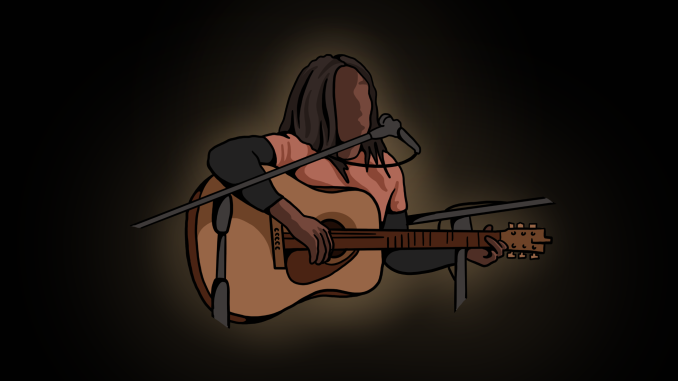
Last semester, I added “playing an open mic” to my second-semester bucket list because the mere thought of performing automatically makes me nervous, but I wanted to address my lifelong stage fright. This semester, I checked it off and learned that making mistakes only adds to my experiences and doesn’t make my memories any less special.
I play guitar and bass and write songs, so I’ve always imagined myself playing shows. However, I was constantly aware of my stage fright and performance anxiety and how I may embarrass myself with mistakes. I’m prone to nervous stuttering, so performance anxiety would surely make me choke in front of the people I play for.
I figured that an open mic would allow me to shed my anxiety by showing me that performing in front of people isn’t as bad as I imagine.
On Feb. 1, I played my first open mic with my friend Jack, an art major at Temple. Jack and I arrived at the venue — a house on North Carlisle Street — excruciatingly early. The two of us, a photographer and the venue owner sat in the house, awkwardly discussing potential band names for half an hour.
“How about ‘Gun Blazing Missile?” the photographer suggested.
Jack and I laughed, and he pointed out the irony between that intense name and the soft acoustic set we prepared.
Eventually, my friends showed up, and roughly an hour into the event, my hands started shaking. Some of my friends asked if I was okay, and I knew they could tell I was nervous.
To ward off my anxiety, I’d repeat to them, “Yeah, I’m just calm,” but whenever I looked around the house and saw how many people were there, my stage fright returned and my hands started shaking again. I began thinking about how my jitters would impact the set.
I’ve known about my stage fright for a while. I always shake whenever I give presentations in class or during internships. During one of our practices, I brought it up to Jack.
“I’ve never frozen, but my voice does get noticeably shaky, like, audibly.” I remember feeling lighter after getting this off my chest.
“Yeah, my voice is definitely going to shake a lot,” Jack said.
When it was time for Jack and I to play at around 10 p.m., my hands became sweaty, leaving my fingertips, calloused from hours of practicing, slippery.
We played five of his original songs and two of mine: “Obsidian Mirror,” a song born from a mistake I made while learning Jack’s song, “Poppies,” and “Femme French,” which I wrote during winter break.
During “Mother’s House,” the first of Jack’s songs, my right hand shook relentlessly. My shakiness almost caused his resonator to fall out of my hands and I wasn’t able to hit all of the strings I needed to. I played better versions of the song during practices, so when our performance didn’t match those, I was frustrated.
During the final verse of one of his songs with the temporary title, “Wind,” Jack was supposed to whistle, but he couldn’t.
“I can’t whistle. My mouth’s too dry,” Jack said, turning to me.
“Oh no. Well, I can’t whistle.”
“Okay, whistle.”
“No. I said I can’t whistle.”
“Somebody whistle!”
After Jack said this, half the people in the room began to whistle while the other half laughed.
When Jack and I finished our final song, people told me how well we did. With a smile, I thanked them and told a few people this was my first time playing.
I didn’t meet my impossible expectations with my imperfect performance, so I didn’t believe the people who were telling us how well we played. I interpreted people’s support as courtesy congratulations, so I accepted the presumably fake support for the time being, and saved my true feelings for when I was alone.
The open mic was my first time feeling imposter syndrome: I felt deeply disoriented because I was receiving applause I thought I didn’t deserve.
In reality, our set was fine. Jack and I communicated well with each other, and people found us funny.
Even though I was too afraid to face the crowd for most of the set, when I heard them laugh at my and Jack’s back-and-forth, my heartbeat slowed and the tension in my shoulders evaporated. The laughs helped me relax my nerves. I realized I was never afraid of the crowd or the opinions of the people watching, I was afraid of the wrath of my own embarrassment for not reaching perfection.
Before Jack and I played our songs, Dylan from the band Attack Dog went on, and I loved every second of it. His fingers didn’t quite land on every string and his strumming speed occasionally fell behind the tempo of his songs, but his easy-going playing added to his originality. His mistakes and his mastery meshed together to create his own personal and beautiful style.
Dylan’s set helped me realize my small mistakes don’t take away from my good memories, my hours of practice or my love for music.
If I had stayed in the mindset of allowing mistakes and imperfection to tarnish my view of myself, I would have repressed this experience filled with friends, laughter, music and new band name ideas. Now, my mistakes only add to my memories as funny reminders of how much fun imperfection is.


Be the first to comment